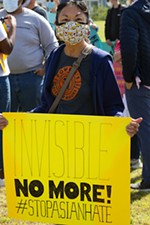Has the Lege Truly Moved Past LGBTQIA Bigotry?
Slow progress toward equality and respect may continue
By Lilli Hime, Fri., Jan. 15, 2021
Last session, House Committee on State Affairs chair state Rep. Dade Phelan, R-Beaumont, intervened to make sure legislation to overturn city ordinances on labor rights – such as Austin's paid sick leave requirement – specifically exempted nondiscrimination ordinances protecting LGBTQIA rights, which queer advocates had fought to enact for decades against fierce opposition. He said at the time that he was "done bashing on the gay community. It's completely unacceptable ... This is 2019."
Phelan is now speaker of the Texas House, despite the shrieking objections of anti-gay activists, which is a sign that pro-equality politics have made it to the mainstream of the Texas Legislature. Any momentum toward progressive protections, however, will encounter more resistance from hard-right GOP members who've already filed harmful anti-trans legislation.
The bitter conflicts over "bathroom bill" measures in 2017 did not occur in 2019, although there were strains over "religious freedom" measures like the "Save Chick-fil-A" bill. In this session, advocates are sounding the alarm on House Bill 68, authored by state Rep. Steve Toth, R-The Woodlands, which seeks to classify any medical care for trans and gender nonconforming youth – including puberty blockers, hormone therapy, and gender affirming surgery – as child abuse.
Andrea Segovia, policy coordinator for Transgender Education Network of Texas, says HB 68 follows a surge of anti-trans bills popping up in state legislatures last year. Segovia says HB 68's language, in addition to being dangerous for trans and GNC youth, is scientifically uninformed and would be difficult to implement if passed. The bill has a wider scope than Segovia believes is intended – affecting health care for cisgender people with certain medical conditions – and also completely excludes intersex people.
Angela Hale of Equality Texas warns that HB 68 need not even pass to produce harmful ripple effects. "Denying best-practice medical care and support to transgender youth can be life-threatening," said Hale. "It has been shown to contribute to depression, social isolation, self-hatred, risk of self-harm and suicidal behavior, and more." The Trevor Project, the nation's largest crisis intervention and suicide prevention effort serving queer and trans youth, has reported exponential spikes in contacts to their suicide hotline – sometimes as much as double – following public debate over trans rights, such as the bathroom bill battles and President Trump's ban on trans service members.
Meanwhile, the members of the House LGBTQ Caucus are backing a comprehensive nondiscrimination bill authored by caucus vice chair state Rep. Jessica González, D-Dallas, which would expand protections in health care, housing, and public accommodations after the U.S. Supreme Court's landmark ruling last year extending employment protections to LGBTQIA Americans. State Sen. José Menéndez, D-San Antonio, has filed the same bill in the Senate. Last summer, a study commissioned by Texas Competes – a pro-equality statewide coalition of business groups – found that a statewide law mirroring the protections in local ordinances protected by Phelan could lead to a $738 million annual increase in state revenue.
Got something to say on the subject? Send a letter to the editor.










